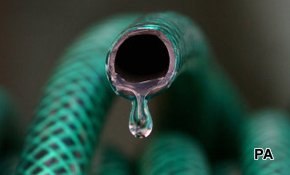John Humphrys asks, is banning hosepipes the right answer? Could we save water elsewhere - or transport it from rainier regions?
It is, of course, typical of British weather that there should be an unseasonal heat-wave just before the Easter break, then a return to winter, cold and rain when we have a few days off. Temperatures in their mid-twenties in north-east Scotland a couple of weeks ago were followed by snowdrifts a week later. And in the south of England the long drought has been replaced by a wet Easter: just in time, in fact, to coincide with the hosepipe ban which looks set to last throughout the summer no matter how much rain falls from now on. But is the ban the right way to deal with water shortage?
There is no doubt about the problem. Lack of rain in the south and east of England over the last couple of years has seen water levels fall in rivers and reservoirs and now we face the worst drought since the mid 1970s. Back then, it seems, politicians could simply will things to change. The day prime minister, Jim Callaghan, appointed an emergency Minister for Drought it rained for the first time in weeks (though there still had to be draconian measures to make us all save water). Now, in order to prevent severe shortages over the summer, water companies in the south and east of the country are imposing tight restrictions on how we can use the water we pay for. Twenty million people are being banned from using their hosepipes, on penalty of a £1,000 fine.
Is banning fair?
The water companies say this is the most effective measure to take in order to conserve water. But the companies vary in precisely what they ban and what they allow. Some tolerate garden irrigation systems which use leaky pipes rather than sprinkler systems; some don’t. Some restrict the use of water to keep golf courses green; some don’t. None (so far as I know) has yet banned the use of high-pressure hoses in commercial car-wash garages. Is this fair?
Many gardeners certainly feel they are being unfairly picked upon simply because it is relatively easy to enforce a hosepipe ban in gardens. Defy it by turning your sprinkler on the lawn overnight and your vigilant, law-abiding neighbour will be certain secretly to report you the following morning. But why, such gardeners ask, should they be discriminated against when all they want to do is water a veg patch that supplies their family with home-grown food while preference is given to golfers who merely want to hit a ball about on a patch of green?
Banning, it’s often said, is the default mode of all bureaucrats but it is neither efficient nor fair. Surely there are better ways to deal with shortage. In the case of water, there is an obvious option. If water-metering were obligatory for all domestic property, it’s argued, then it ought to be possible simply to ration how much water each household could use during periods of water shortage and then fine those who use too much. That way we could be treated as adults in making our own decisions about how to use the limited amount available to us. If we wanted to go for a few days without a shower in order to be able to use a hosepipe on our strawberry crop, then so be it. There would, of course, be a bit of bureaucratic bother in such a system as each household’s allocation would have to be related to the number of people living at the property, but surely that’s better, it’s argued, than a blanket ban on the use of hosepipes. The word ‘freedom’ comes to mind.
Saving water
Such a system would also encourage us all to be more careful in our use of water. Many people already are – the sale of water butts has been soaring. But we could go much further. It’s not just a case of remembering not to keep the cold tap flowing while we brush our teeth. Why do we need to flush the loo every time we have a pee? We don’t. Why don’t we stick a bucket in the shower and use the collected water on the garden? Because it never occurs to us.
The need for more careful use of water in a metering/rationing system could have much more far-reaching implications. It seems pretty stupid, when you think about it, that we use drinking-quality water to flush our loos, when a relatively simple reordering of our plumbing systems could channel ‘grey water’ (like bath water or the water we use for washing up) for the same purpose.
It’s not just individuals and households that are so wasteful of something which is becoming an increasingly precious commodity. Water companies are profligate too. One of the intentions behind water privatisation was that the money raised in charging us all for water would become available for investment in the industry, making up for the decades of neglect during which our Victorian water system largely went unmaintained. To be fair, the companies have got on with the job, but the water regulator, Ofwat, estimated that 3.3bn litres of water still leaked from the system in England and Wales every day in 2010/11. That also explains why your lawn may turn brown this summer.
Transporting water?
But if, as we are often told, climate change means we may be in for more frequent droughts in future, should we not be looking at the problem more radically? One obvious point is that the water shortage is not affecting the whole country. Scotland and the north of England have not been suffering from lack of rain: far from it. Since their reservoirs are full, shouldn’t we be making plans to collect more water up in the north and then transport it down to the dry areas of the south and east?
The standard reply to such an obvious suggestion is that water is very heavy (which it is) and so is expensive to transport. But should that be the end of the story? After all, it is not beyond our wit to transport water over large distances. The Romans made a very good job of it with their system of pipes and aqueducts that lasted centuries. Could we not do the same? We are incomparably richer than the Romans were and more technologically advanced. So, in the end, it is a matter of priorities. Isn’t there at least a case for considering spending our billions on such an investment rather than, say, on high speed rail?
Looking even more broadly at the matter, it’s obvious that the earth, as a whole, does not suffer from a shortage of water: most of the earth is water, the trouble being that most of it is saltwater. Desalination is the solution here. Once again, it is expensive; but once again, it is a matter of priorities.
Perhaps the difficulty lies in our lack of confidence in our predictions about the future of our climate. The risk is that we take a punt now on changing our domestic plumbing arrangements, building new reservoirs in Scotland and the north of England, laying new pipelines and constructing new aqueducts, setting up loads of desalination plants … and then we have a decade of heavy rainfall. ‘A typical case of planning gone bonkers’, we’ll say in retrospect. In the face of such uncertainty it’s easier to impose the occasional hosepipe ban. But is it the right policy?
What’s your view?
- Will the hosepipe ban affect you badly or not?
- Do you think the water companies are broadly selecting the right targets for the ban, or do you think gardeners are being unfairly picked upon?
- What do you make of the idea that water metering should be compulsory and then each household rationed during periods of drought, with individuals left to decide for themselves how they use their limited ration?
- What do you think of water-saving ideas, such as using grey water to flush loos or water gardens?
- Do you have any tips for saving water?
- Do you think the Government should be investing more in infrastructure projects such as building more reservoirs in the north and then transporting water south, or in desalination plants and, if so, what other spending projects should be sacrificed in order to finance them?
Let us know your views in the comment box below.









